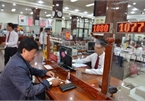
The new decree will allow commercial banks to authorize third parties contracted by the banks to carry out some kinds of transactions with clients, such as account opening, cash hand-in/withdrawal and money transfer, and serve as collection/payment agencies.
Banking agents have been allowed to operate in many countries and they have succeeded with different operation models. In Vietnam, three banking agent models at MBBank, PGBank and Vietcombank operate on a trial basis and have shown initial positive results.
The decree compilation agency believes that banking agents will increase access to financial services regardless of living conditions and geographical conditions.
Commercial banks applaud the new policy, hoping that it will help them make a breakthrough in expanding the banking network coverage, reaching out to rural and remote areas.
A banker said that banks are having difficulties in providing services to remote areas because of the low numbers of clients and transactions, while the costs to open branches and transaction offices are relatively high and the procedures are complicated.
If banks are allowed to provide services through third parties, they will have greater opportunities to expand the market and serve more clients. Through their banking agent networks, banks would also be able to sell other services of their partners, such as e-wallets and bancassurance.
The compilation agency has set a lot of limitations on this kind of banking outlets, especially on agents which are non-bank businesses. It wants 80 percent of total agents to operate in rural areas, and it doesn’t allow individuals and households to work as agents.
| The new decree will allow commercial banks to authorize third parties contracted by the banks to carry out some kinds of transactions with clients, such as account opening, cash hand-in/withdrawal and money transfer, and serve as collection/payment agencies. |
The limitations could make it difficult for banks to find suitable agents to provide services in remotes areas.
Meanwhile, China has allowed owners of groceries and restaurants to work as banking outlets since 2011. In India, banks are encouraged to use agents who are retired officers and teachers. Individual agents are also allowed in other Southeast Asian countries, including Thailand, Indonesia and the Philippines.
Banks have also expressed worry about draft regulation that 80 percent of agents must operate in suburban districts. Will banks have to shut down outlets in Dong Anh and Thuong Tin in Hanoi, and Nha Be and Cu Chi in HCM City, once the suburban districts become inner city districts?
Another worry comes from the tentative regulation that the number of institutional outlets of every bank must not exceed the number of branches of the bank. This will make it difficult for small banks to open outlets.
Meanwhile, small banks, with small networks, have higher demand for banking agents than big banks, which already have large networks.
State Bank of Vietnam said that small banks can use the banking agents with big banks with existing large networks of branches and transaction offices, to expand their operation. However, bankers replied that it is very difficult to do this.
“This will pose big problems, not only for competition and brand recognition. In principle, one bank cannot use the technique of another bank to provide services,” a banker explained.
He went on to say that if the policy aims at expanding the coverage of banking services and helping banks seek new clients, the priority subjects should be the agents outside the current banking system.
Meanwhile, the limitations set by SBV on the transaction value of no more than VND200 million a day and on the agent service fee (the fee must not be higher than the bank fee) are also feared to discourage the new business model.
The current fees set by banks for the small-value transactions of cash handing in/withdrawing and transferring are very low, just 0.3-0.6 percent of transaction value. Some commercial banks even don’t collect fee for the services in an effort to attract deposits.
So, if the draft regulation is applied in reality, and the limitation on transaction value is set, the revenue from service fee would be insignificant and unattractive.
According to Tran Dinh Thien, a respected economist, the draft decree still lacks orientation for the development of non-cash payment in Vietnam in the context of rapid development of technology and international integration.
He said that policy makers need to be sure that policies have openness high enough to satisfy people’s expectations. While saying that being cautious is a necessity, he said stronger actions and more drastic measures are needed in the current conditions.
Tran Thuy

SBV allows banks to expand credit room
The State Bank of Viet Nam (SBV) has just officially approved credit room extension for some banks.

Banks make huge profits, hope interest rate reductions are far off
Banks have reported huge profits for Q2 and H1 due to high credit growth rates and lending interest rates, while capital mobilization cost has been low.